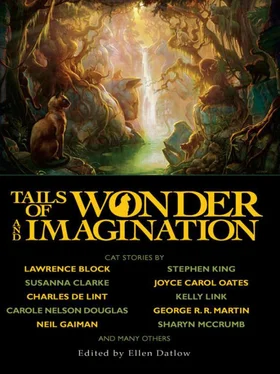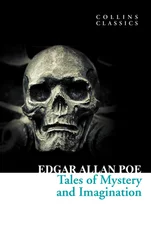Ellen Datlow - Tails of Wonder and Imagination
Здесь есть возможность читать онлайн «Ellen Datlow - Tails of Wonder and Imagination» весь текст электронной книги совершенно бесплатно (целиком полную версию без сокращений). В некоторых случаях можно слушать аудио, скачать через торрент в формате fb2 и присутствует краткое содержание. Год выпуска: 2010, ISBN: 2010, Издательство: Night Shade Books, Жанр: Фэнтези, Фантастика и фэнтези, Ужасы и Мистика, на английском языке. Описание произведения, (предисловие) а так же отзывы посетителей доступны на портале библиотеки ЛибКат.
- Название:Tails of Wonder and Imagination
- Автор:
- Издательство:Night Shade Books
- Жанр:
- Год:2010
- ISBN:978-1-59780-170-6
- Рейтинг книги:5 / 5. Голосов: 1
-
Избранное:Добавить в избранное
- Отзывы:
-
Ваша оценка:
- 100
- 1
- 2
- 3
- 4
- 5
Tails of Wonder and Imagination: краткое содержание, описание и аннотация
Предлагаем к чтению аннотацию, описание, краткое содержание или предисловие (зависит от того, что написал сам автор книги «Tails of Wonder and Imagination»). Если вы не нашли необходимую информацию о книге — напишите в комментариях, мы постараемся отыскать её.
collects the best of the last thirty years of science fiction and fantasy stories about cats from an all-star list of contributors.
Tails of Wonder and Imagination — читать онлайн бесплатно полную книгу (весь текст) целиком
Ниже представлен текст книги, разбитый по страницам. Система сохранения места последней прочитанной страницы, позволяет с удобством читать онлайн бесплатно книгу «Tails of Wonder and Imagination», без необходимости каждый раз заново искать на чём Вы остановились. Поставьте закладку, и сможете в любой момент перейти на страницу, на которой закончили чтение.
Интервал:
Закладка:
As I muse in the antique air of suite 711, I recall that there is coyote, and then there is Coyote. Coyote of Native American legend is also called the Old Man, the Trickster, the Dirty Old Man who is at times advised by his own droppings. It is said that Coyote takes many forms and that to deal with him is always dicey, for he embodies the worst and the best of humankind.
I contemplate that though I have saved coyote clan from an underhanded attack, I have also saved humankind from the ricochet of that attack upon itself, that I have suffered hunger and thorns in my feet, not to mention threats to body and soul, and I have nothing to show for it but coyote peyote.
My self-esteem is so low that I could win a limbo contest dancing under it.
And then I notice that a console across the room has flipped its lid. I have seen that ash-blonde oblong of furniture for many years, and never knew that it had a lid to flip.
By the way the light dances inside the lid, like an aurora borealis, the lid interior is mirrored, and in that mirror is reflected an oval image.
The image flickers eerily, then resolves. Sound issues from the bowels of the cabinet. I sit mesmerized, even when I realize that I am watching a late-Forties-vintage TV set display a perfectly ordinary contemporary television show I do not normally deign to watch—that exercise in tabloid journalism known as “the Daily Scoop,” but which I call the Daily Pooper Scooper in my septic moments. Or do I mean skeptic?
Whatever, what to my wandering eyes should appear but a camera-pan across the entry sign to Peyote Skies. An offscreen voice begins saying what a tony development this is, and discusses the rash of coyote poisonings culminating in the tragic poisoning of the developer’s daughter. Caitlyn’s image flashes across the screen, smiling and happy.
Next I see an image of Mr. Phelps being led away in handcuffs by grim-looking men. Hallelujah!
Then Miss Ashley Ames, a most attractive anorexic bottle-blond with bony kneecaps, comes on screen with a breathless narrative.
It seems that little Caitlyn Ruggles’s poisoning was considered a tragic mistake stemming from a misguided attempt by a Peyote Skies employee to rid the development of pet-napping coyotes… until the child victim regained consciousness and began speaking of the unspeakable. “Uncle Phil” had been sexually abusing her.
Caitlyn’s shocked parents called the police. An investigation revealed that P.W. Phelps, a vice president in the Peyote Skies Company, had indeed been abusing the child, who was beginning to talk of telling.
“It is alleged,” Miss Ashley Ames says in a tone that is most delightfully dubious about the “alleged” part, “that he poisoned the half-dozen coyotes to create a pattern in which the ‘accidental’ death of young Caitlyn Ruggles would be seen as a tragic side effect.
“Had it not been,” she goes on, and I can hardly believe my ears, even though they are standing at full attention, “for the lucky chance that a starving stray black cat fought the child for the poisoned piece of a major fast-food chain hamburger, this nefarious scheme would have never been discovered.”
I am more than somewhat taken aback by my description as “starving.”
The next shot distracts me: Caitlin and her parents all smiles at the Las Vegas Humane Society, adopting a small black kitten. Even the kitten is smiling.
I am smiling. Hell, I suspect that somewhere Coyote is smiling.
In fact, as the ancient television’s image and sound fade, I believe I glimpse a silver-haired human dude with mighty big ears vanishing through a crack in the door.
I recall that Jersey Joe Jackson hid a few caches around Las Vegas in his time. And that Coyote never changes, and always does. And that he performs tricks, maybe even with vintage television sets.
The best and the worst of both beast and man himself.
Indeed.
THE POET AND THE INKMAKER’S DAUGHTER
Elizabeth Hand
Elizabeth Hand is the multiple-award-winning author of numerous novels and three collections of short fiction. She is also a longtime reviewer for many publications, including the Washington Post, Salon, Village Voice and the Boston Globe, and is a columnist for the Magazine of Fantasy & Science Fiction . Illyria , her World Fantasy Award-winning novel inspired by Shakespeare’s Twelfth Night was recently published for the first time in the U.S. Her most recent novel is Available Dark , a sequel to the Shirley Jackson Award-winning novel Generation Loss.
Hand says: “When I was eight or nine years old, one of my favorite books was Frances Carpenter’s Tales of a Chinese Grandmother , traditional fairy tales retold for a more modern, western audience. A few years later I fell in love with Lafcadio Hearn’s Japanese ghost stories, especially ‘The Boy Who Painted Cats.’ ‘The Poet and the Inkmaker’s Daughter’ is an homage to those stories. There are various legends about Japanese bobtail cats, including an origin tale about a cat whose tail caught on fire: the panicked cat ran through the streets, setting houses aflame in its wake. Its descendants to this day have no tail.”
Heian Japan
In the reign of she who became known as the Dark Willow Empress, there lived in a far-off city a poet by the name of Ga-sho. He lived as all poor poets do, upon memories and tea-dregs, but what sustained him most of all were thoughts of a certain young woman, a maid to a lady-in-waiting to the Dark Willow Empress. This young woman had no name, at least none that Ga-sho knew of. He had glimpsed her only once, as she followed the litter bearing her mistress along a canal and then over a bridge at the city’s edge. The hem of her kimono was spattered with mud and rotten waterweeds, but her face—what he could see of it, anyway, as she kept her head down and her long sleeve held before her cheeks—was exquisite, with skin as fine and white as rice paper and long-lashed eyes like chrysanthemum blossoms. As he stood aside on the bridge to let her pass, he caught the strong fragrance of kurobo, sweet incense, trailing her like a warm wind. For this reason, and the beauty of her eyes, in his thoughts he called her Fair Flower.
Ga-sho had inherited a small sum after his father’s death, enough to keep a tiny room in the very darkest quarter of the city. Here, before a brazier no bigger than his cupped hands, Ga-sho wrote his poems upon scrolls of rice paper. All of his verses praised Fair Flower’s beauty, her gentleness, her devotion and her virtue (though mostly he wrote of her beauty). He did not know that the young woman he loved was in fact bad-tempered and shrill, with a voice like green sticks breaking; that she gambled with the other maids and had amassed a considerable debt, which she had absolutely no intention of paying; that she snored, and her breath often stank of plum wine, even in the morning; that she had for some time now been trysting with a handsome gardener in the Dark Willow Empress’s employ; and that she dallied also with the gardener’s cousin, and occasionally with the cousin’s best friend, who worked in the lower kitchen. (The name they had for her was less flattering than “Fair Flower,” and I will not reveal it here.)
No, Ga-sho’s poems took none of this into account, and that is perhaps for the best. That which is true often makes for very dull reading.
Poor as he was, Ga-sho kept a cat. She was a fastidious creature, bobtailed as cats of that time and place were, with pale grey eyes and black front paws; not as beautiful as Fair Flower, perhaps, but with far better manners. The most remarkable thing about her was her color: a strange, deep reddish brown, the color of new bronze tinged with blood. Such red cats were considered to have special powers by the superstitious, and were called Kinkwaneko, Golden Flower, but Ga-Sho, while a sentimental sort when it came to women, was not particularly superstitious. He called her Clean-ears.
Читать дальшеИнтервал:
Закладка:
Похожие книги на «Tails of Wonder and Imagination»
Представляем Вашему вниманию похожие книги на «Tails of Wonder and Imagination» списком для выбора. Мы отобрали схожую по названию и смыслу литературу в надежде предоставить читателям больше вариантов отыскать новые, интересные, ещё непрочитанные произведения.
Обсуждение, отзывы о книге «Tails of Wonder and Imagination» и просто собственные мнения читателей. Оставьте ваши комментарии, напишите, что Вы думаете о произведении, его смысле или главных героях. Укажите что конкретно понравилось, а что нет, и почему Вы так считаете.












